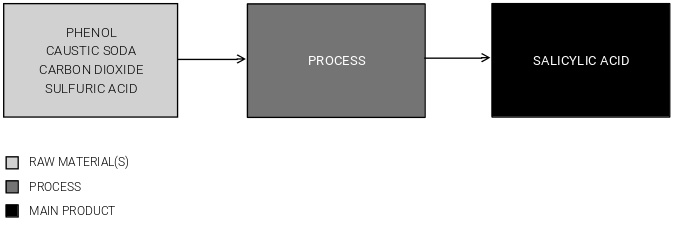Commodity Production Costs Report
Salicylic Acid Production
Salicylic Acid Plant Capital & Operating Cost Analysis | United States | Q4 2025
This report presents the economics of Salicylic Acid production from phenol, sodium hydroxide, carbon dioxide, and sulfuric acid. In the process, sodium phenolate is prepared by reacting phenol and hot aqueous sodium hydroxide. The solution is heated, evaporated, and then reacted with carbon dioxide, producing sodium salicylate, which is further acidified with sulfuric acid producing Salicylic Acid.
The report provides a comprehensive study of Salicylic Acid production and related Salicylic Acid production cost, covering three key aspects: a complete description of the Salicylic Acid production process examined; an in-depth analysis of the related Salicylic Acid plant capital cost (Capex); and an evaluation of the respective Salicylic Acid plant operating costs (Opex).
The Salicylic Acid production process description includes a block flow diagram (BFD), an overview of the industrial site installations, detailing both the process unit and the necessary infrastructure, process consumption figures and comprehensive process flow diagrams (PFD). The Salicylic Acid plant capital cost analysis breaks down the Capex by plant cost (i.e., ISBL, OSBL and Contingency); owner's cost; working capital; and costs incurred during industrial plant commissioning and start-up. The Salicylic Acid plant operating costs analysis covers operating expenses, including variable costs like raw materials and utilities, and fixed costs such as maintenance, labor, and depreciation.

Product
Salicylic Acid.
Raw Materials
Carbon Dioxide, Caustic Soda, Sulfuric Acid, Phenol.
Report in PDF Format
Download & Explore Anytime
Access in Various Devices
Print & Read Comfortably
Share With Co-workers
Up-to-date Report
Professional report based on Q4 2025 economic data, ensuring timely evaluations.
Multiple Use Cases
Ideal for investment screening, feasibility studies, cost estimates, and research planning.
Proven Methodology
Developed using a consistent methodology honed over a decade, ensuring reliable cost analyses.
Report Editions
Content Highlights
Plant Capital Cost Summary
Summary outlining the capital cost required for building the Salicylic Acid production plant examined.
Plant Capital Cost Details
Detailing of fixed capital (ISBL, OSBL & Owner’s Cost), working capital and additional capital requirements.
Plant Cost Breakdowns
Breakdown of Salicylic Acid process unit (ISBL) costs and infrastructure (OSBL) costs; plant cost breakdown per discipline.
Operating Costs Summary
Summary presenting the operating variable costs and the total operating cost of the Salicylic Acid production plant studied.
Operating Cost Details
Detailing of utilities costs, operating fixed costs and depreciation.
Plant Capacity Assessment
Comparative analysis of capital investment and operating costs for different Salicylic Acid plant capacities.
Production Process Information
Block Flow Diagram, descriptions of process unit (ISBL) and site infrastructure (OSBL).
Process Consumptions
Raw materials and utilities consumption figures, by-products credits, labor requirements
Process Diagrams
Process flow diagrams (PFD), equipment list and industrial site configuration
Could Not Find the Report You Need?
Obtain a Bespoke Report
Get a report targeting the process in which you are interested
See Offer Details
Understand Bespoke Reports and how you can easily order them
Check Editions & Pricing
Complete a brief form and see a quotation for your Bespoke Report
Other Related Production Cost Reports

Sodium Hydroxide Production from Sodium Chloride (Diaphragm Process)
It presents the economics of Sodium Hydroxide production from brine in the United States. The process examined in this report is a typical diaphragm process. Chlorine and hydrogen are also generated as by-products in the process.
Details: 600 kta United States-based plant | Q4 2025 | 107 pages | Issue B | From $799 USD

Sulfuric Acid from Sulfur (Single-Contact Process)
This report presents the economics of Sulfuric Acid production from sulfur in the United States. In this process, sulfur is burned to form sulfur dioxide, which is then converted to sulfur trioxide. This sulfur trioxide is converted to sulfuric acid by absorption with recirculating sulfuric acid solution in water in only one column.
Details: 1480 kta United States-based plant | Q4 2025 | 107 pages | Issue B | From $799 USD

Phenol Production from Toluene
This study reviews the economics of a process producing Phenol from toluene. Initially, toluene is oxidized to benzoic acid intermediate in liquid phase, which is then converted to Phenol in the liquid phase in the presence of cupric and magnesium benzoates. The economic analysis presented assumes a plant constructed in the United States.
Details: 50 kta United States-based plant | Q4 2025 | 107 pages | Issue D | From $1,199 USD

Sulfuric Acid from Spent Acid (Wet Gas Sulfuric Acid Process)
This report presents the economics of spent sulfuric acid regeneration via wet sulfuric acid (WSA) process in the United States. In this process, spent acid is decomposed to form sulfur dioxide and water. The sulfur dioxide is oxidized to sulfur trioxide, which is then regenerated to sulfuric acid by vapor-phase reaction with water.
Details: 150 kta United States-based plant | Q4 2025 | 107 pages | Issue F | From $999 USD

Sodium Hydroxide Production from Sodium Chloride (Membrane Process)
This report presents the economics of Sodium Hydroxide production from sodium chloride in the United States, via a typical membrane process. In this process, sodium chloride is decomposed electrolytically, producing sodium hydroxide. Chlorine and hydrogen are generated as by-products in the process.
Details: 550 kta United States-based plant | Q4 2025 | 107 pages | Issue A | From $799 USD
+800 Reports Developed, Targeting +250 Commodities
Vast Report Library
858 independent and up-to-date reports examining embryonic and established production processes.
Free Sample Reports
Quickly understand the structure and depth of content of our professional reports.

